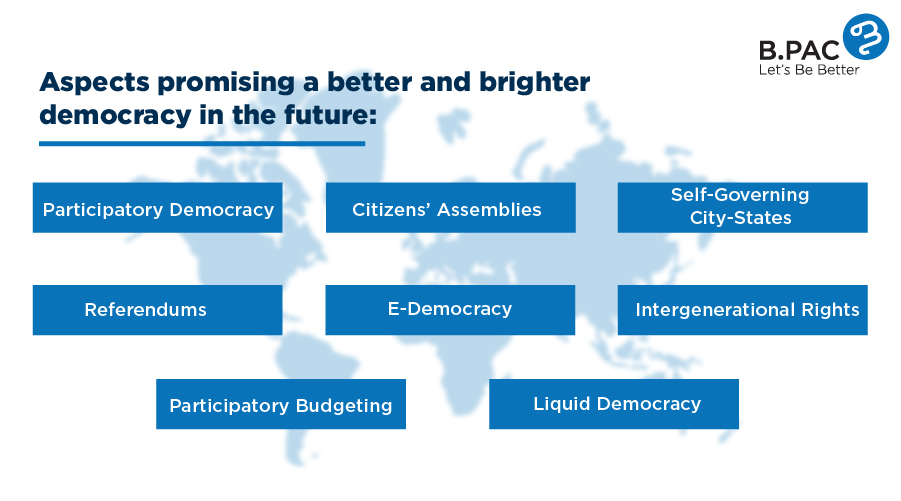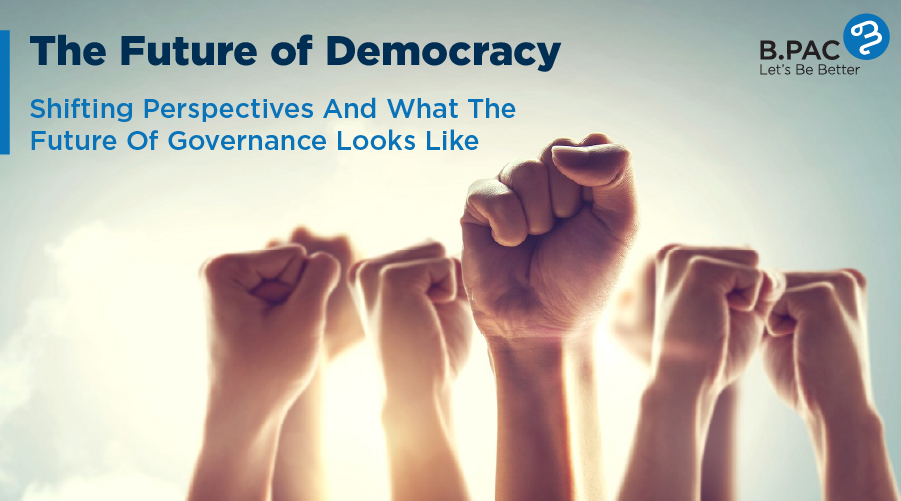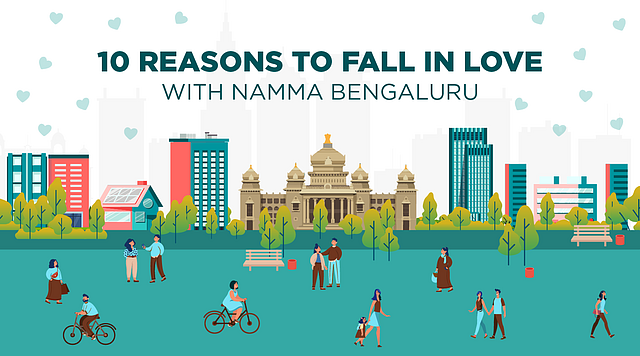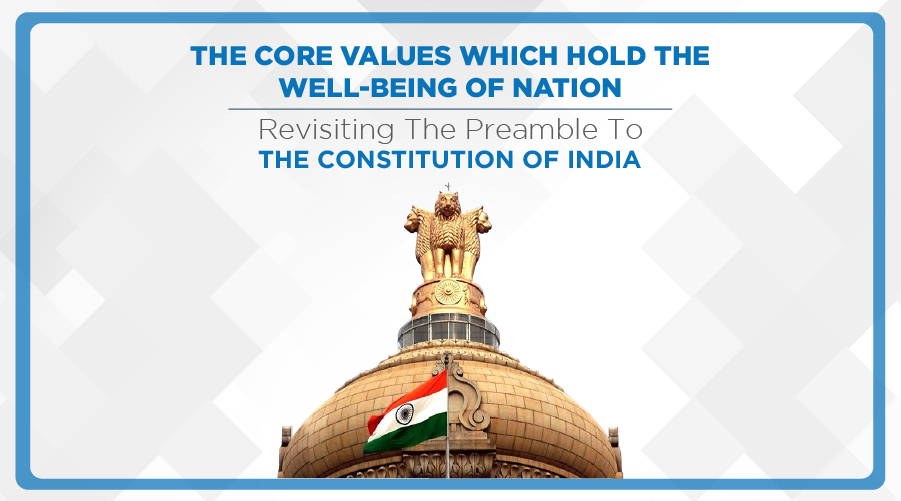Shifting Perspectives And What The Future Of Governance Looks Like
Abraham Lincoln, the 16th president of the United States, defined democracy as “a government of the people, by the people and for the people”. Do you think this statement holds good in today’s times and is relevant even for the future?
Democracy, in today’s world, is a result of numerous political movements born out of revolutions, rebellions and shifting beliefs among the people. While it exists as a belief for many nations, it is also a farfetched dream for a few.
A Brief History of Democracy:
While contemporary philosophers like Plato and Aristotle criticised the very idea of Democracy, Cleisthenes, a leader in Greece (and the father of Athenian democracy), introduced the term demokratia or ‘rule by the people’. Nations across the globe eventually accepted the idea of democracy, and today, it continues to be a perpetually evolving concept with scope for improvement.
The Present Democracy in the World:
In today’s scenario, 23 nations celebrate citizen rights by being fully democratic. Fifty-two countries in the world have a democracy that consists of certain flaws (flawed democracy). Thirty-five nations have a hybrid regime where electoral issues prevent democracy, and 57 countries are still reeling under authoritarian control, with meagre or no freedom at all! (Democracy Index Report, 2020)
According to a report by Freedom House, the onset of the pandemic in 2020 had many governments worldwide resorting to excessive surveillance and discriminatory restrictions. Countries with solid democratic institutions ensured that the limits on freedom depended solely on the threat posed by the virus. A few other countries used the situation to enhance their power and override opposition.
Despite the effects of the pandemic, democracy can be aptly identified as a goal and a continuing process in many countries, giving each nation a lot to work on and improve upon for the future.
The Shift in Perspectives:
Despite being an established form of governance, representative democracy vests the power in the hands of the elected representatives, which limits the scope of citizen participation to an extent. For many of us, ‘democracy’ is a bookish term and is mostly about a lesson from a civics chapter. For a few of us, ‘democracy’ is just about voting. The onset of pandemic, climate change and various other social issues have prompted the citizens to become more aware of their rights. This has resulted in a need to involve citizens in policies affecting their lives.
According to political culture research professor, Christian Welzel, the recent economic developments have expanded the levels of knowledge, awareness and intelligence among people. This has inspired and empowered people to think for themselves and act with a purpose, rather than just accepting authority. The evolving ideologies of people have resulted in the need for a sustainable and futuristic governance.
The Future of Democracy:
The future of governance is citizen participation and it looks promising because the citizens are taking charge of knowing and understanding their rights. They are also armouring themselves with information.

Here are the aspects that promise a better and brighter democracy in the future:
- Participatory Democracy:
Participatory democracy grants citizens the opportunity to directly participate or be involved in the decisions that have a sizable impact on their lives. In a participatory democracy, the politicians are responsible for implementing all the policy decisions of the citizens. Many democracies and institutions in the world are shifting towards higher citizen engagement, with inputs of the citizens being considered seriously:
- The United Kingdom has a deliberative democratic process where randomly selected citizens are invited to take part in debates. They make suggestions on numerous topics like climate change, COVID-19 recovery, and others that impact the citizens.
- The onset of the pandemic allowed the Taiwan government to involve its citizens in decision-making using digital tools.
- Members of Parliament in France developed a national platform to collect the ideas of the citizens.
The role of citizens, either physically or virtually, plays a crucial role in ensuring happy and futuristic governance.
- Citizens’ Assemblies:
The citizens’ assembly allows the citizens to make decisions at a city or sometimes the national level. This assembly consists of residents who are selected based on demographic criteria. They have the power to deliberate over issues, come up with practical solutions and make informed decisions while concluding what they think should happen. Citizens’ Assemblies give people the time and opportunity to learn and discuss a topic before arriving at a workable recommendation.
The entire idea of decisions made through group deliberations can be traced back to the Athenian assemblies. Citizens’ Assembly gained popularity only in the second half of the 20th century when British Columbia randomly selected 161 people to decide on an alternative voting system in 2004. A well-known example of a successful Citizens’ Assembly is Ireland’s Citizens’ Assembly, which led to a referendum on same-sex marriage (2014) and the removal of an amendment on abortion (2017).
With the Citizens’ Assembly gaining popularity, the UK and France have also used it to identify innovative and fair solutions to the climate change crisis. The Brexit situation also prompted nations like Scotland and Manchester to opt for a Citizens’ Assembly when it came to deciding on matters of importance, significantly impacting the citizens.
If adopted effectively, the Citizens’ Assembly, an interface between deliberative and direct democracy, can also help push other democracies in the world to greater heights.
- Self-Governing City-States:
A city-state is a single city with a government that exercises complete control over itself and all the territories within its borders. A city-state functions as a political, economic and cultural hub.
A city-state has the full power to govern itself and its citizens without any involvement of the other governments. An apt example is the city-state of Monaco, which is located in France but is not subjected to French policies or laws. The other self-governing city-states in the world are Singapore and Vatican City.
When the decision-making power gets decentralized from the central government to the state, it results in a self-governing city-state. This devolution in authority will encourage the city-state to become more capable of tackling issues and benefit the future of democracy. Democracy becomes a manageable, futuristic function when micro-productivity is introduced.
- Referendums:
Referendums are innovative solutions that grant the citizens greater decision-making power. Referendums allow citizens to vote on a question and express their will and voice regarding a particular political issue. It can be initiated by the government or by the people.
Here are some popular referendums over the years:
- Switzerland’s system of direct democracy allows its citizens to be heard. As a result, the nation has held nearly 300 referendums since 1848.
- Italy opts for referendums when it comes to important aspects like divorce, abortion, trade unions and the electoral system. The nation has held about 70 referendums to date.
- Ireland resorts to referendums quite often. The nation has had 35 referendums, since 1937, on different topics like divorce, same-sex marriage and parliamentary inquiries.
- The most famous referendum in the UK was when the public was asked if the UK should remain a member of the European Union or leave it. This came to be known as the Brexit Referendum. It had 52% voting in favour of leaving the European Union and 48% voting to stay. Despite the referendum’s result not being binding on the UK government, it decided to follow the people’s will.
While referendums seem increasingly popular in many nations, they hold great promise for many developing democracies globally. When people are given an option to voice their honest opinions, it will make the prevalent democracy more futuristic.
- E-Democracy:
Electronic democracy or E-democracy is a term used to indicate a variety of proposals made to increase the participation of citizens in the democracy through the use of information and communication technology (ICT). Electoral intervention in democracy is a way to educate the citizens and improve electoral politics and minimize malpractices.
Covid-19 has made E-Democracy highly relevant in today’s world. The pandemic forced many countries to implement many safety measures and, as a result, limited social movement. This did not deter the citizens from voicing out their opinions as digital platforms continued to gain popularity.
From providing instant access to the same information to all individuals to online submission of applications from remote areas, e-democracy plays a creative role. Here are some nations that have adopted E-Democracy in their system:
- Citizens in the US and Canada have access to numerous websites that offer E-democracy components like campaigns, information and access to legislative alerts.
- Sweden offers its citizens numerous options when it comes to e-democracy.
- The United Kingdom is progressive when it comes to E-Democracy, and most government services are online.
- The Singapore government is recognized as an innovator for its efforts to offer electronic services.
Information and communication technology is a boon and vital support in improving the process of governance. E-Democracy is the best solution when it comes to increasing citizen participation in the management of a nation.
- Intergenerational Rights:
Intergenerational rights are legal mechanisms that guarantee the rights and well-being of future generations.
When the rights of future generations are embedded into the legal system, it encourages all the citizens to protect it actively. Though a promise to the future generation seems slightly impossible, many nations have already incorporated it into their system:
- In 1993, an environmental lawyer won a landmark case in the Philippines, guaranteeing future generations the right to live in a healthy environment.
- In 2019, the Dutch Supreme Court passed a future-friendly verdict when it stated that the government has a legal duty to protect its citizens from the future impact of climate change.
A democracy that allows its citizens to leave behind a legacy for its future generations in the form of a sustainable and healthy environment, ensuring intergenerational rights might be the apt element for every democracy.
- Participatory Budgeting:
Participatory budgeting is a system in which the civic officials and the elected representatives sit with the citizens to decide on allocating a municipal or public budget.
Here are some countries that have successfully implemented participatory budgeting in its system:
- Bolivia, Guatemala, Nicaragua and Peru have brought in participatory budgeting in all local governments.
- Several towns and cities in France, Portugal, Italy and Spain have commenced the participatory budgeting process.
- Porto Alegre, in Brazil, has an annual participatory budgeting system where citizens and elected budget representatives decide spending priorities and vote on priorities to be implemented.
- In Scotland, the government introduced participatory budgeting as a tool to engage communities.
Participatory budgeting offers numerous advantages to the citizens of a nation, like having their voice heard in civic governance, fostering community ownership, engaging communities equally and, paving the way for increased trust and mutual understanding between the government and the people.
- Liquid Democracy:
Liquid democracy is a relatively new term and a form of delegative democracy. It is a form of decision-making where the citizens are given complete decisional control. The citizens can engage in collective decision-making through direct participation (direct democracy) or by selecting representatives who get to vote on their behalf (representative democracy).
Countries like Austria, Germany, Italy, France, Norway, Belgium, Spain and the Netherlands have been using software to obtain inputs from interested citizens to represent them effectively.
The very idea of liquid democracy holds a lot of promise for many democracies around the world. If adapted successfully, liquid democracy will enable citizens to impact the future to a great extent.
Why does the democratic system need to evolve?
According to the Council of Europe, democracy includes a lot more than elections. It must consider the will of the people and not just the institutional or voting systems. Democracy can be stated as something that we can always have more of. There is scope for democratic systems to always be more inclusive, reflective and responsive towards people’s wishes. The system can always enhance the ‘people’ part of democracy by having more citizens take part in the decision-making process and giving them more power.
As Thomas Jefferson aptly states, “Information is the currency of democracy”! Let’s be aware and take steps to understand the potential of democracy and how we can engage effectively to bring about a futuristic shift! Think about it, how would you want the future of democracy to be?





